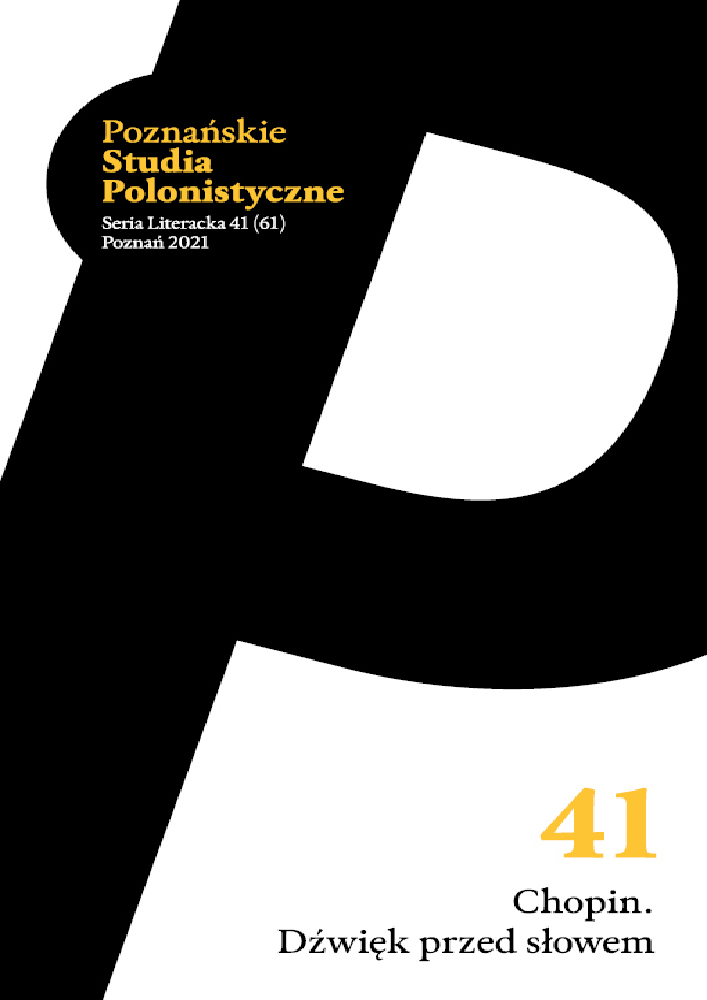Abstract
The drama Ostatni koncert (The Last Concert) (1960) by Stanisława Fleszarowa-Muskat, originally written as a radio play, sits on the border between popular and fictional literature. The text was intended for a wide audience. The plot focuses on a single event – Frédéric Chopin’s last concert in Warsaw, just before his departure to France, which took place on October 11, 1830. Youth, as it was understood by the romantics, turns out to be a time that shaped Chopin’s artistic personality. In this drama, the independence background is important as it highlights Chopin’s ties to the fate of his homeland, which gives his music a patriotic and revolutionary dimension. In sounds, Chopin’s brilliant music expresses the essence of the Polish soul: its nobility and love of freedom. Chopin’s concert took place at a turning point both for the composer and for the nation whose spirit he expressed through sounds. The drama about Chopin, the national genius, is at the same time a drama about a national community that acquires its identity by identifying with his music.
References
Boniecki Edward (1991), Jak pisać o Chopinie? Wokół kontrowersji Szymanowski – Iwaszkiewicz, „Ruch Literacki”, nr 6, s. 681-693.
Burek Tomasz (1987), Żadnych marzeń, Polonia Book Fund Ltd., Londyn.
Cieśla-Korytowska Maria (2004), Aneks, w: tejże, Romantyczne przechadzki pograniczem, Universitas, Kraków, s. 229-364.
Dec Agata (1992), Kilka uwag o powieści-flądrze na młodopolskim rynku czytelniczym, „Literatura i Kultura Popularna”, z. 2/3, s. 67-75.
Fleszarowa-Muskat Stanisława (1960a), Ostatni koncert [dramat w 3 aktach], [słuchowisko].
Fleszarowa-Muskat Stanisława (1960b), Ostatni koncert [dramat w 3 aktach], „Dialog”, nr 7, s. 40-46.
Fleszarowa-Muskat Stanisława (1965), Ostatni koncert [dramat w 3 aktach], Ludowa Spółdzielnia Wydawnicza, Warszawa.
Hejmej Andrzej (2010), Chopin i jego muzyka w literaturze, [dostęp: 1 grudnia 2010], http://www.chopin.pl/chopin_w_literaturze.pl.html. Kaden-Bandrowski Juliusz (1938), Życie Chopina, Gebethner i Wolff, Warszawa.
Korotkich Krzysztof (2020), Kwaśne pomarańcze „W Białymstoku”. O mało popularnym wierszu Agnieszki Osieckiej, [dostęp: 15 grudnia 2020], https://tinyurl.com/kzk6psn8.
Kubikowski Zbigniew (1965), Bezpieczne, małe mity, Ossolineum, Wrocław.
Kuźma Erazm (1994), Literatura popularna a literatura wysokoartystyczna, „Literatura i Kultura Popularna”, nr 45 (1621), s. 78-81.
Lichański Jakub Z. (2014), Badania literatury popularnej. Tezy, w: Literatura i kultura popularna. Badania i metody, red. Anna Gemra, Adam Mazurkiewicz, Pracownia Literatury i Kultury Popularnej oraz Nowych Mediów, Wrocław, s. 21-45.
Maciąg Kazimierz (2010), „Naczelnym u nas jest artystą”. O legendzie Fryderyka Chopina w literaturze polskiej, Wydawnictwo Uniwersytetu Rzeszowskiego, Rzeszów.
Mitosek Zofia (1974), Literatura i stereotypy, Ossolineum, Wrocław.
Norwid Cyprian (1983), Pisma wybrane, t. 1, wybrał i objaśnił Juliusz Witold Gomulicki, PIW, Warszawa.
Nowaczyński Adolf (1948), Młodość Chopina, Czytelnik, Warszawa.
Poniatowska Irena (2001), Historyczne przemiany recepcji Chopina, w: Chopin – w poszukiwaniu wspólnego języka. Materiały z konferencji, red. Artur Szklener, NIFC, Warszawa, s. 37-52.
Poniatowska Izabela (2014), Modernizm bez granic. Wielkie tematy nowoczesności w polskich powieściach popularnych drugiej połowy XIX wieku, Wydawnictwo Wydziału Polonistyki Uniwersytetu Warszawskiego, Warszawa.
Schaff Adam (1981), Stereotypy a działanie ludzkie, Książka i Wiedza, Warszawa.
S.J. (1968), Stanisława Fleszarowa-Muskat. Sylwetki, „Nowe Książki”, nr 18, s. 4.
Stołek-Nawrocka Mariola (2009), Kolska pisarka. Twórczość Stanisławy Fleszarowej-Muskat, Wystawy i Wydawnictwo K.K. im. Zdzisława Krzyszkowiaka, Warszawa.
Świerkosz Krystyna (2014), Na fali. Portret biograficzny Stanisławy Fleszarowej-Muskat, Oskar, Gdańsk.
Tarnowski Stanisław (1892), Chopin i Grottger. Dwa szkice, Księgarnia Spółki Wydawniczej Polskiej, Kraków.
Tomaszewski Mieczysław (2020), Cykl audycji „Fryderyka Chopina Dzieła Wszystkie”, Polskie Radio Program II, [dostęp: 1 grudnia 2020], https://pl.chopin.nifc.pl/chopin/composition/detail/page/2/id/47.
License
Authors
Authors of texts accepted for publication in „Poznańskie Studia Polonistyczne. Seria Literacka” are required to complete, sign and return to the editor's office the Agreement for granting a royalty-free license to works with a commitment to grant a CC sub-license.
Under the agreement, the authors of texts published in „Poznańskie Studia Polonistyczne. Seria Literacka” grant the Adam Mickiewicz University in Poznań a non-exclusive, royalty-free license and authorize the use of Attribution-NoDerivatives 4.0 International (CC BY-ND 4.0)Creative Commons sub-license.
The authors retain the right to continue the free disposal of the work.
Users
Interested Internet users are entitled to use works published in „Poznańskie Studia Polonistyczne. Seria Literacka” since 2016, for non-commercial purposes only, under the following conditions:
- attribution - obligation to provide, together with the distributed work, information about the authorship, title, source (link to the original work, DOI) and the license itself.
- no derivatives - the work must be preserved in its original form, without the author's consent it is not possible to distribute the modified work, such as translations, publications, etc.
Copyrights are reserved for all texts published before 2016.
Miscellaneous
Adam Mickiewicz University in Poznań retains the right to magazines as a whole (layout, graphic form, title, cover design, logo etc.).
